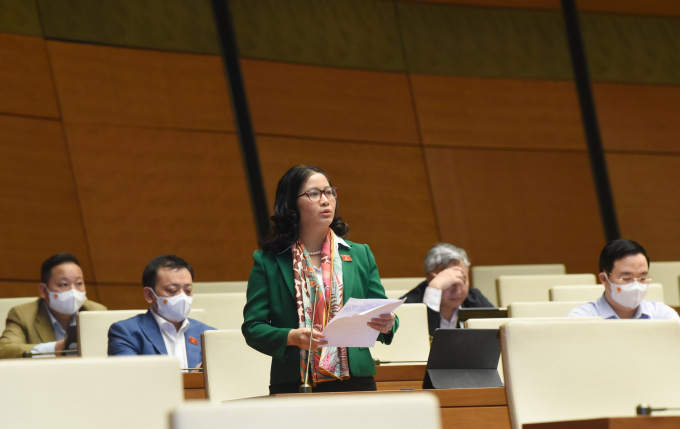November 27, 2025 | 02:34 GMT +7
November 27, 2025 | 02:34 GMT +7
Hotline: 0913.378.918
November 27, 2025 | 02:34 GMT +7
Hotline: 0913.378.918
At a National Assembly (NA) discussing session on the national land use planning for the period 2021-2030, vision to 2050 and national 5-year land-use plan (2021-2025), NA deputy Nguyen Thi Lan from Hanoi’s delegation said that one of the most important tools for the State in managing land and effectively promoting its management role of this invaluable resource is to develop a land-use plan.
The quality of land use planning plays an extremely important role in socio-economic development, ensuring the security and defense of any country.

National Assembly deputy Nguyen Thi Lan said that one of the most important tools for the State in managing land and effectively promoting its management of this invaluable resource is to develop a land-use plan. Photo: HVNN.
According to the NA deputy, a national land-use plan must be based on the following aspects: the Party’s and State’s development orientation; long-term strategies and undertakings; practical conditions and development trends in recent times; the development rules and common trends of the world; some key balances of land use demands such as the balance of food security to decide land areas for rice-growing; the need for environmental protection to identify the area of special-use and protected forests; a balance in demands for water supply to identify areas of large rivers and streams; a balance of fishery reserves and fishing capacity in fishing areas to determine the size and location of fishing in the sea and on the continental shelf.
In addition, a drafted plan needs to be set up to identify natural advantages for socio-economic development in each ecological region as well as potentials and essential directions in planning for these regions. It needs to take into account some key projections of factors affecting land use in the future such as climate change, food demand, issues relating to development (population increase and decrease, urbanization, and industrialization,...). It should also be concerned about major risk scenarios such as those of natural disasters, epidemics and wars as well as conflicts in water resources of the main shared rivers, fishing, mining, and traffic disputes at sea.
At the same time, it is necessary to take into account the infrastructure investment capacity, population adjustment and economic distribution to change the appearance and scale of the country's land properties. Other impacts and changes may take place due to international economic integration, scientific and technological development, and other factors...
Regarding the assessment of the land potential for the agricultural sector, NA deputy Lan suggested that it is necessary to highlight more the assessment of sea surface exploitation, fishing and aquaculture, especially in coastal areas and the seashore areas around the big islands, because Vietnam is a maritime country.
Currently, agricultural land used for livestock is still small compared to the national plan, so it is not shown on the map. Therefore, it should be mentioned to guide for in local plans.
According to Lan, this issue is related to environmental factors, pandemic prevention and control, the balance among agricultural production areas… However, the current Land Law does not mention land for livestock farming.
In addition, further analysis on climate change has shown that huge impacts will threaten the whole country’s agricultural production, especially the Mekong River Delta, Central Highlands, North Central, and the Northern Midlands and Mountains.
A forecast about the land fluctuation trend in the whole country also shows that unused land has decreased sharply, and there is almost no land reserve.
Therefore, the NA deputy requested a plan for mobilizing all land resources to form an adequate large national reserve land. Along with that, it is necessary to plan for an increase in the quantity and quality of forests...
Translated by Linh Nguyen

(VAN) After the institutional merger, Da Nang possesses significant forest-carbon reserves and is proactively engaging in the carbon market, creating a new revenue stream.

(VAN) An Giang strengthens communication against IUU fishing, increases inspections and sanctions, and is determined to remove the EC’s “yellow card” while developing a sustainable fisheries sector.

(VAN) As green transition becomes a global trajectory, Viet Nam’s biggest challenge is not only technology and models, but how to ensure that capital flows reach the right beneficiaries.

(VAN) The Ministry of Agriculture and Environment must spearhead the construction of green governance, spanning decision-making processes and investment standards to policy evaluation mechanisms.

(VAN) The Agriculture and Environment sector of Khanh Hoa has achieved numerous milestones over the past 80 years, contributing significantly to the goal of establishing the province as a centrally governed city by 2030.

(VAN) Viet Nam is entering the pivotal period of 2025-2030, moving toward the formulation of the Remote Sensing Law, which will establish a legal foundation for the development of national digital data.

(VAN) The agricultural sector is finalizing the strategic framework for emission reduction, setting the goal of sharply cutting methane and 403.7 million tons of CO2 equivalent and moving toward Net Zero by 2050.